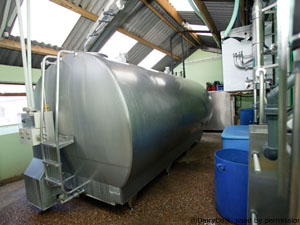SEPA Temporary Regulatory Guidance Response to COVID-19: Land Application of Uncollected Milk in Scotland
1 April 2020Background
The Scottish Environment Protection Agency (SEPA) is committed to supporting everyone it regulates during the Covid-19 outbreak, whilst maintaining protection of Scotland’s environment. SEPA will listen and quickly respond to challenges as they emerge and welcomes early discussions with operators to achieve shared solutions.
SEPA expects everyone it regulates to take all reasonable steps to remain in compliance with Scotland’s environmental laws. SEPA also expects operators to be preparing themselves as far as practical for the challenges of the Covid-19 outbreak with the aim of ensuring that impacts on the environment are minimised.
Multi-agency regulatory guidance
Multi-agency guidance has been prepared for Dairy Producers in Scotland whose milk is uncollected during the Covid-19 pandemic and where, unfortunately, disposal by land application at the farm where it was produced becomes necessary. SEPA has developed this guidance with the Animal and Plant Health Agency (APHA), the Scottish Government, Scottish Government Rural Payments and Inspections Division (SGRPID), with National Farmers Union Scotland (NFUS) and the Scottish Dairy Hub both aware and supportive. Disposing of milk to land is subject to Animal By-Products legislation enforced by the APHA. SEPA has included pollution prevention measures alongside precautions set out by the APHA. SGRPID has offered advice to farmers on meeting Nitrate Vulnerable Zone requirements.
It has been identified that the National Emergency for the Coronavirus pandemic could lead to raw milk remaining uncollected on farms in Scotland and that this may mean that such milk may require to be disposed of.
If such unfortunate circumstances were to arise, the following guidance is in place:
- It is vital that milk is not allowed to directly discharge to a surface water drainage system or watercourse. This is because the presence of milk will strip out oxygen from the watercourse, seriously impacting its ecology, including causing fish deaths.
- SEPA, Scottish Government, SGRPID and APHA have taken the position that raw milk may be applied to land as an organic fertiliser/soil improver without processing.
What should I do with my uncollected milk?
In the case where milk cannot be collected from your farm, and you need to empty your bulk tank you should take action as follows:
- Drain your bulk tank to the farm slurry storage system.
- The slurry/milk mixture may be applied to land in accordance with GBR18 of the Controlled Activities Regulations.
- If in a Nitrate Vulnerable Zone, spread within the limits of the action programme and/or farm nutrient management plan.
- The slurry/milk mixture may be applied in a single application at a maximum rate of 30m3/ha.
- No repeat applications to the same parcel of land within three weeks.
- Following land application, no livestock are allowed on that land for at least 21 days.
If you are unable to comply with this guidance please contact nationalrural@sepa.org.uk before applying milk to land.
Read the full guidance document published by SEPA here.
Sign up to the FAS newsletter
Receive updates on news, events and publications from Scotland’s Farm Advisory Service

